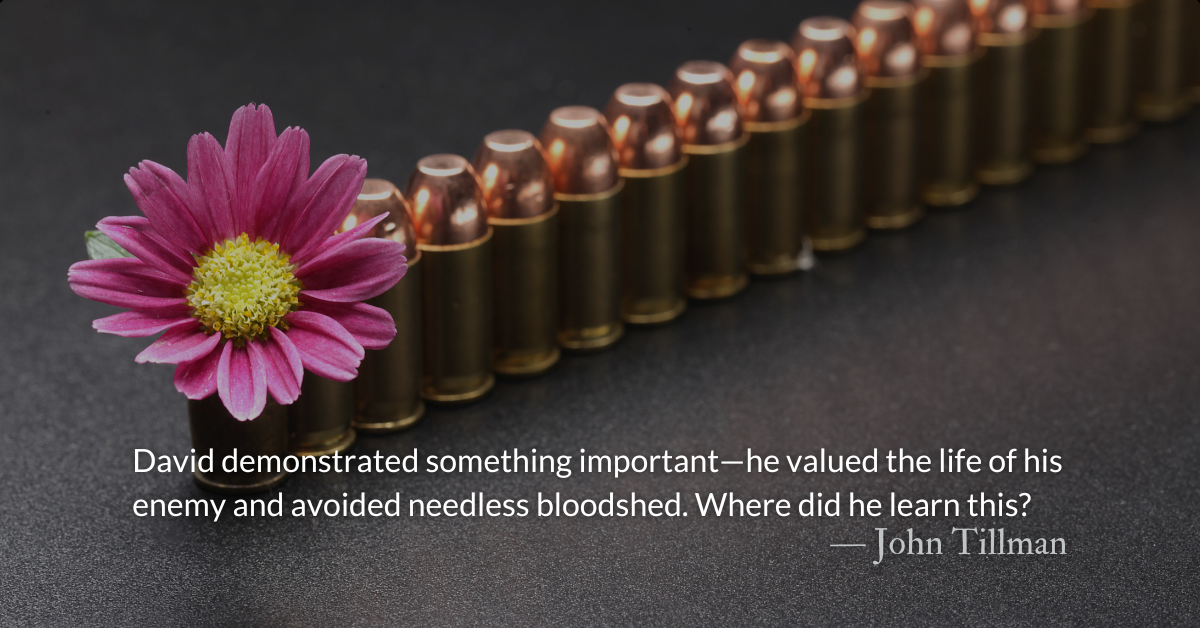Links for today’s readings:
Read: 1 Samuel 26 Listen: (4:30) Read: Revelation 6 Listen: (3:12)
Scripture Focus: 1 Samuel 26.7-8
7 So David and Abishai went to the army by night, and there was Saul, lying asleep inside the camp with his spear stuck in the ground near his head. Abner and the soldiers were lying around him. 8 Abishai said to David, “Today God has delivered your enemy into your hands. Now let me pin him to the ground with one thrust of the spear; I won’t strike him twice.”
1 Samuel 25.29, 31
29 Even though someone is pursuing you to take your life, the life of my lord will be bound securely in the bundle of the living by the Lord your God, but the lives of your enemies he will hurl away as from the pocket of a sling….31 my lord will not have on his conscience the staggering burden of needless bloodshed or of having avenged himself…
Reflection: Abishai or Abigail?
By John Tillman
The incursion began at night. Using stealth, the heroes sneaked past guards, through the arrangement of tents and military equipment. They reached the highly guarded target. The moment to strike came…but the purpose of the mission was a surprise. It was not the assassination plot it first seemed. The leader had another purpose.
Incursions into enemy territory are high-risk military missions with defined and often violent goals such as destroying infrastructure or weapons, or capturing or assassinating key individuals. This is what Abishai expected when David asked him to sneak into Saul’s camp.
Saul lay unprotected. Saul’s spear stood, stuck in the ground near his head. The spear’s point was sharp and could have silently cut through Saul’s throat. Instead, David used the spear to make a point that cut Saul to the heart. Saul confessed his sin, called David “son,” and promised not to harm him.
Saul would break this promise, leading to an even closer encounter in which David would once again spare Saul’s life. (1 Samuel 24.4-12) However, David demonstrated something important—he valued the life of his enemy and avoided needless bloodshed. Where did he learn this?
David’s logic seems heavily influenced by Abigail’s masterfully worded speech in the previous chapter. Abigail convinced David not to exact revenge on her husband. Then Nabal died (by God’s hand), and Abigail became David’s wife. (1 Samuel 25.37) Abigail’s influence turned David from a man who would commit mass murder to avenge an insult (1 Samuel 25.21-22) into a man who would risk his own life to avoid needlessly shedding blood, even of his enemy.
Our world is just as (or even more) violent than David’s. Yet, in our day-to-day lives, most of us don’t live as close to violence as David did. We are privileged when our experiences of violence are in our entertainment choices and not in our homes, streets, or countries. However, we still think in violent metaphors and live among those with kill-or-be-killed ethics.
Examine your relationship to violence and the ethics of power. Whose mindset do we have? Abigail’s or Abishai’s? For Abishai, the opportunity to strike indicates God’s approval. For Abigail, refraining from violence is an act of faith and a mark of God’s approval.
How do we want leaders to act? What advice would we give? Pin enemies to the ground and destroy them? Or value their lives and appeal to their common humanity?
Listen to Abigail.
Divine Hours Prayer: The Request for Presence
Look upon your covenant; the dark places of the earth are haunts of violence. — Psalm 74.19
– Divine Hours prayers from The Divine Hours: Prayers for Summer
by Phyllis Tickle
Read more: Our Deliverer — Guided Prayer
We can, in the day of our disaster, rely on God. Our success depends on God, not our own strength or the intervention of an ally.
Read more: Blocking the Way of Wickedness
May we be like Abigail, willing to risk our lives…standing in the way of those intent on harm and violence.






